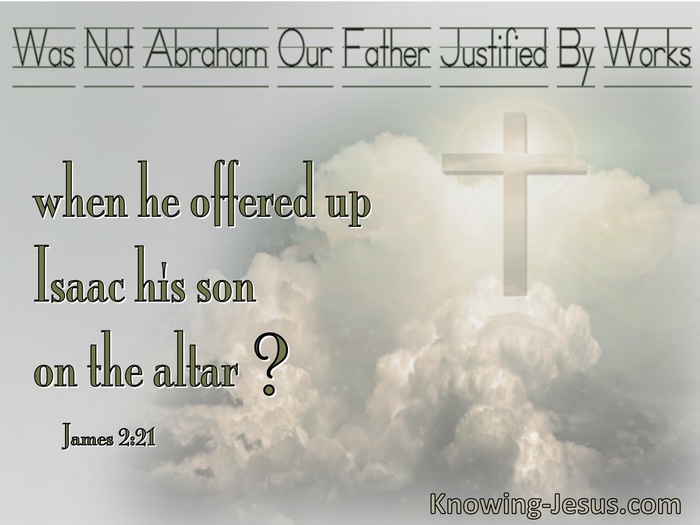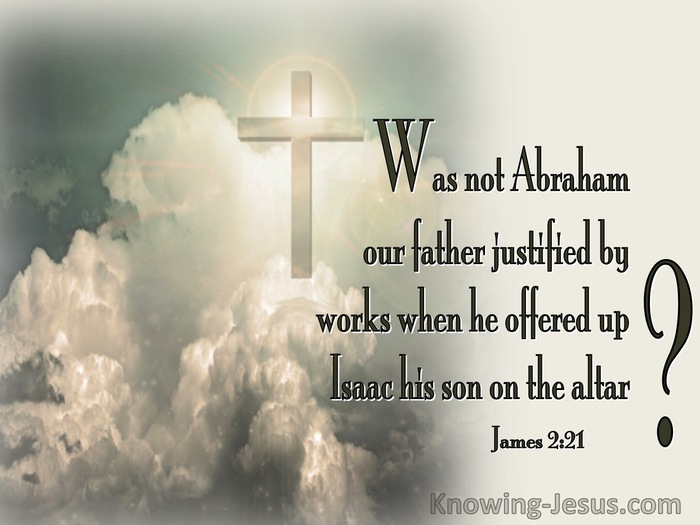◄ What Does James 2:21 Mean? ►
Was not Abraham our father justified by works when he offered up Isaac his son on the altar?
James 2:21(NASB)
Verse of the Day
One of the most controversial verse in James, if not in the New Testament, is James 2:21 which states: "Was not Abraham our father justified by works when he offered up Isaac, his son, on the altar?" This verse has caused consternation in the Church and division in denominations. The question continues to rage and appears to contradict Paul's teaching that we are not justified by works, but by faith in the finished work of Christ on the Cross.
This passage has been used by some to teach a works-based salvation. It has been used to enslave and control generations of believers, by insisting that without engaging in religious rites and rituals they are not saved, but under God's condemnation.
Luther was unable to reconcile this doctrine with the many Scriptural verses which teach we are justified by faith and not by works, lest any man should boast. He condemned James as 'an epistle of straw' because it appeared to teach the opposite of Paul's writings. But James is part of the Bible, and unless these two conflicting views are reconciled, it throws doubt on the inerrancy of the entire Word of God! The question must be addressed: Are we justified by faith or by works?
The answer is simple when this verse is read in context. James is explaining that good works do not save a person, but are the result of having been saved. Good works do not save us but flow from a life that has trusted God's Word. The natural result of being saved is the production of good works, and James cites Abraham as an example of a man who had been justified by faith, and whose works demonstrated his trust in God.
The verse could read: Was not our forefather Abraham shown to be justified through his works, when he brought to the altar as an offering, his own son Isaac? Didn't Abraham demonstrate that he was already justified when he obeyed God's command by sacrificing his son? Wasn't he shown to be upright by his good deeds, namely by offering Isaac his son upon the altar?
God called the idol worshipping Abraham out of Ur of the Chaldees in Genesis 11, to go to a land He would show him. Abraham believed God and left his home by faith, not knowing where he was going. In chapter 15, when God made a covenant with Abraham and promised to give him a son through whom the whole earth would be blessed, we read: "Abraham BELIEVED God, and it was reckoned to him as righteousness."
Abraham was saved / justified in chapter 15 (if not before) because of his faith. He was not saved / justified because of his work of offering Issac on the alter in Genesis chapter 22. His offering of Issac on the alter was a consequence of his being justified earlier in his life. This incident took place many years after Abraham had been saved or 'justified'. The offering of Isaac was a work that flowed from a life that trusted God, from an already justified man who was already saved by grace through faith.
But there is a secondary issue in this verse that needs to be addressed; the meaning of justification in relation to salvation and its wider meaning in everyday life.
Usually the word 'justified' or 'justification' in Scripture, relates to being born again. Justification in this context happens at a point in time; the moment we are saved by grace through faith. From that moment on, we should demonstrate we are saved through good works which God has already prepared for us to do. Justification in Scripture generally refers to a sinner, saved by God's grace through faith.
It is a 'salvation' label given to a child of God who is covered in Christ's righteousness, forgiven of sin, a recipient of eternal life, and many other incredible privileges. But a broader meaning is to substantiate something; to provide 'justifiable' grounds for a statement or defends a particular position.
James is calling Christians to godly living, a mature faith, patience when tested, a joyful attitude in trials, a gracious compassion for others, and someone who is to be a 'doer' of the Word and not simply a hearer only. He is using the world 'justified' in this verse to 'justify' calling believers to good works in their Christian life.
Context is important if we are not to be influenced by incorrect doctrine, and so is a thorough understanding of the whole council of God. May we study to be approved unto Him and be careful to be a doer of His Word and not a hearer only.
My Prayer
Heavenly Father, thank You that there is nothing contradictory in Scripture. I pray that you would open my understanding of passages that may be difficult to understand or that false teachers take out of context, in order to promote an unbiblical doctrine. Thank You that, like Abraham, I am saved by grace through faith and that my salvation depends on the work that Christ has already done, and not on the works I do in my life. And thank You that, like Abraham, I can demonstrate my faith and love to You by performing good works, as led by the Spirit. May my life be one that is holy unto You and that honours Your name. In Jesus' name, AMEN.
Choose a Verse from James 2
James 2:21 Further Study
- James 2:21 in the Parallel Bible
- James 2:21 in the Thematic Bible
- James 2:21 Cross References
- James 2:21 Treasury of Scripture Knowing
- James 2:21 Sermons
- James 2:21 Prayers
- James 2:21 Images
- James 2:21 Answers
- Choose Chapter
Never miss a post















